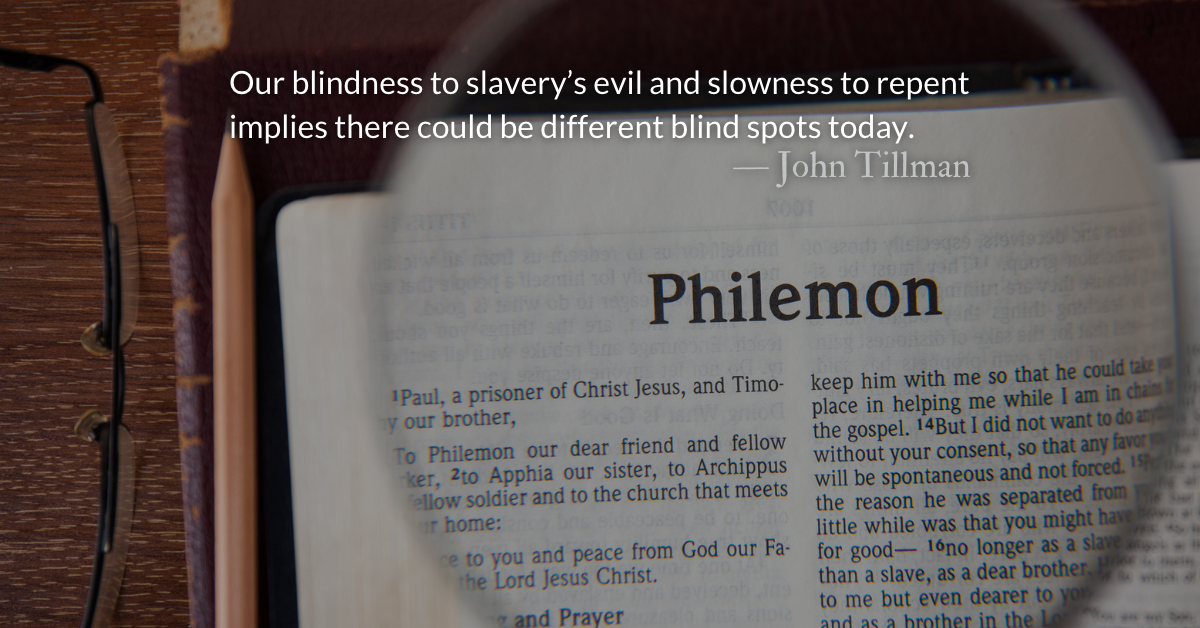Scripture Focus: Philemon 8-11
8 Therefore, although in Christ I could be bold and order you to do what you ought to do, 9 yet I prefer to appeal to you on the basis of love. It is as none other than Paul—an old man and now also a prisoner of Christ Jesus— 10 that I appeal to you for my son Onesimus, who became my son while I was in chains. 11 Formerly he was useless to you, but now he has become useful both to you and to me.
Reflection: Speak to Philemon
By John Tillman
Our aversion to slavery is historically atypical. Excepting the last 200 years or so, the prevailing thought of the world’s elite philosophers and rulers was that slavery was not just acceptable, but a moral good.
Slavery aligned well with most religious and political systems. Slavery supported the despotic theology and ideology of authoritarianism and social stratification. Gods and emperors were on top, then the wealthy and powerful, then ordinary men, then women, then slaves at the bottom.
Even if we transported ourselves and our belief that slavery is evil back in time to Paul’s day, what could we do? If we went to the market, slaves would be sold there. If we bought property, it would be built and maintained by slaves. Slavery touched every part of life. It was woven into political and financial systems. Slavery was unavoidable. Yet, we find Paul and others resisting and subverting the practice.
Slavery is not culturally acceptable anymore, but many ideologies that enslave both bodies and minds are. We live among cultural assumptions that shape our media, our economy, our schools, and our politics. Many are wicked, unjust, and unavoidable.
How do we live within unjust systems and during an unjust time?
Paul’s letters, especially Philemon, show us one way. Paul never led a slave revolt and his words have been twisted to support slavery, but his careful, thoughtful logic and loving, inclusive actions eroded the philosophical foundations of slavery.
Despite the fact that many Christians, past and present, defend slavery, the idea that slavery is evil comes exclusively from Christian theology. Local slave rebellions or individual rulers partially freeing some slaves occurred in ancient history. But nowhere in any culture does a consistent cry arise to abolish slavery for all people everywhere, except among the followers of Jesus. However, it is not to our glory that abolitionism arose from Christianity. It is to our shame that it took so long.
Somehow, through all the pressure of cultural ideology, Paul pushed back against slavery. But it took us too long to see it. Our blindness to slavery’s evil and slowness to repent implies there could be different blind spots today. What is culture telling us today that we accept without question? Speak to your “Philemon.” How can you, gently and with love, erode the philosophical foundations of oppressive ideologies? How can you, in love, set people free through the gospel?
Divine Hours Prayer: The Small Verse
My soul thirsts for the strong, living God and all that is within me cries out to him.
– From The Divine Hours: Prayers for Summertime by Phyllis Tickle.
Today’s Readings
Joshua 8 (Listen 5:55)
Philemon (Listen 2:52)
Read more about Philemon’s Speck and Our Log
Our existence is supported by the labor of people who directly or indirectly serve us, just as Onesimus served Philemon.
Read more about Slavery, Racism, and a Lone Christian Voice
In the late fourth century a lone Christian voice spoke out against the oppressive institution of slavery in a way that none had before.






